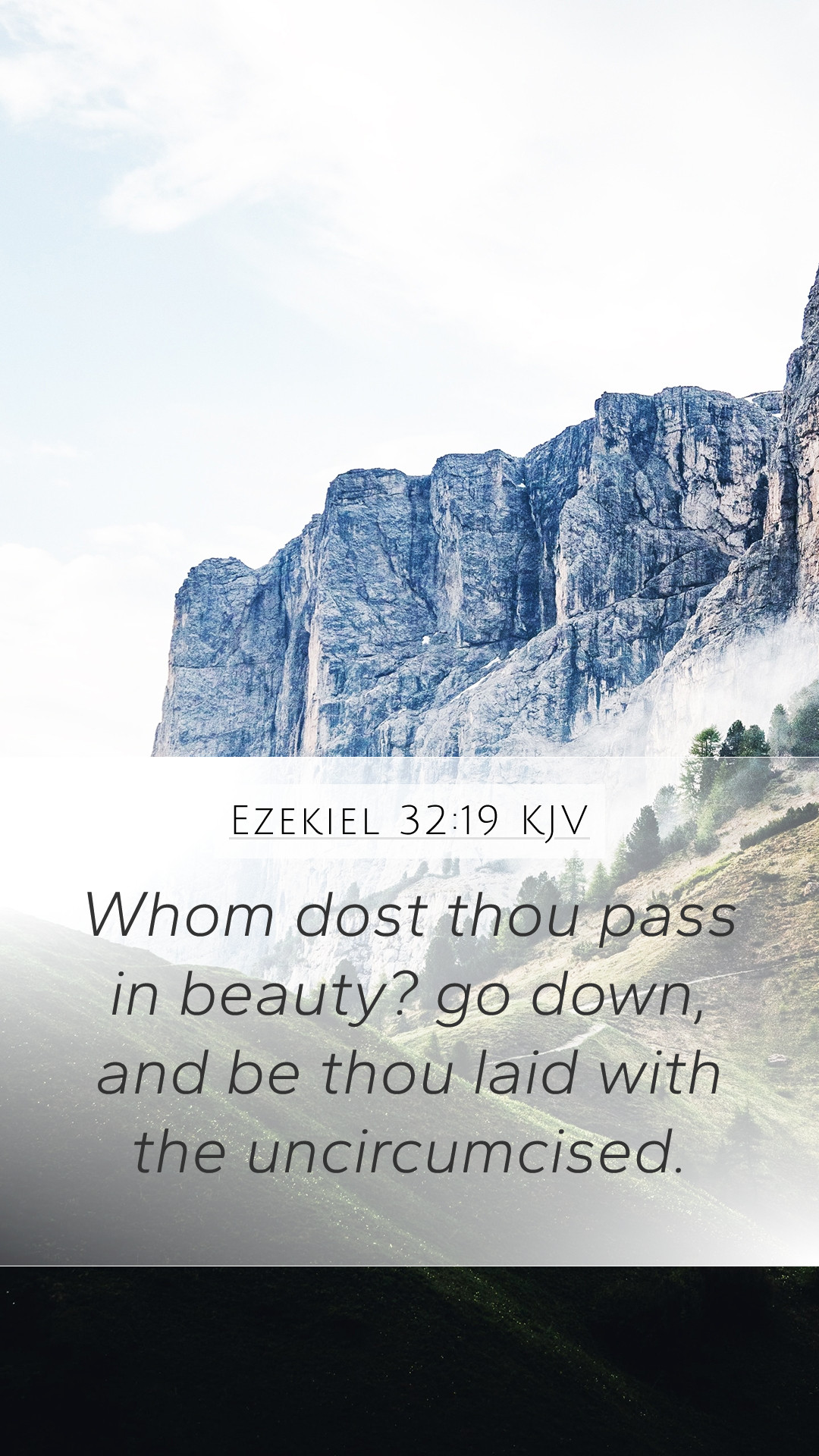Ezekiel 32:19 - Bible Verse Meaning and Commentary
Verse: "Whom dost thou pass in beauty? Go down and be thou laid with the uncircumcised." (Ezekiel 32:19 KJV)
This verse forms part of a larger passage in the book of Ezekiel, wherein God communicates through the prophet Ezekiel regarding the fate of Egypt. The imagery and language used are rich in meaning and historical significance, and understanding this verse helps unlock deeper biblical insights.
Summary of Insights from Public Domain Commentaries
- Matthew Henry's Commentary:
Henry emphasizes that this verse reflects God's judgment against Egypt and its leaders, highlighting their false security and pride in their beauty and strength. The question posed by God, "Whom dost thou pass in beauty?" serves to remind Egypt of its impending downfall and insignificance compared to the divine judgment awaiting them. This illustrates the theme of humility and recognition of God’s sovereignty over nations.
- Albert Barnes' Notes:
Barnes points out that the phrase "laid with the uncircumcised" represents being among those judged and condemned. In the ancient Near Eastern context, to be uncircumcised was to be outside of the covenant community, symbolizing a state of being cut off from God's promises. Barnes elaborates on this, asserting that the pride of Egypt would lead them to a desolate state, ultimately resulting in their association with those outside of God's favor.
- Adam Clarke's Commentary:
Clarke delves into the metaphorical significance of beauty and pride in this context. He interprets this verse as a stark reminder to Egypt of its ephemeral glory and status. Clarke notes that the ultimate fate of Egypt in death will strip away all pretense of beauty, leading them to join others who have faced divine judgment. Clarke's analysis underscores the idea that worldly power and beauty are transient and ultimately meaningless before God.
Understanding the Context of Ezekiel 32:19
The passage occurs within a prophetic oracle directed at Pharaoh and the nation of Egypt, denouncing their pride and warning them of impending destruction. Ezekiel's prophecies often utilized stark imagery and rhetorical questions that drove home the seriousness of God's message.
The metaphor of beauty in this verse can be linked to a broader biblical narrative entailing human pride and reliance on external characteristics, often at the expense of recognizing divine authority. The exhortation to "go down" serves as a call to humility and a recognition of the inevitable decline that accompanies divine judgment.
Key Themes and Application
- Divine Judgment: This verse starkly portrays the consequences of arrogance and disobedience toward God. It emphasizes the truth that no nation or leader is immune to divine accountability.
- The Inevitability of Death: It serves as a reminder that all worldly beauty and power are fleeting and that death is the great equalizer of humanity.
- Call to Humility: The rhetorical question challenges readers to contemplate their own lives, urging a humble posture before the Almighty, especially in the face of their own strengths or achievements.
Cross References
- Ezekiel 31:18: Comparison to the fate of the Assyrian leader emphasizes themes of downfall.
- Ezekiel 34:17-19: God’s condemnation of shepherds (leaders) who are negligent.
- Isaiah 14:9-11: Describes the descent into Sheol of the prideful.
Incorporating the Insights into Bible Study
For those engaging in Bible study groups or seeking Bible study tools online, this verse encourages profound reflection on the nature of human pride and the eventual humility that comes through acknowledgment of God’s sovereignty. It can prompt discussions on the applications of these verses to daily life, as well as help in forming Bible study lessons focusing on the attributes of God.
Additionally, those looking for Bible study guides can explore the rich symbolism present in Ezekiel, as well as the broader applications across both Old and New Testament teachings regarding judgment, redemption, and humility.


